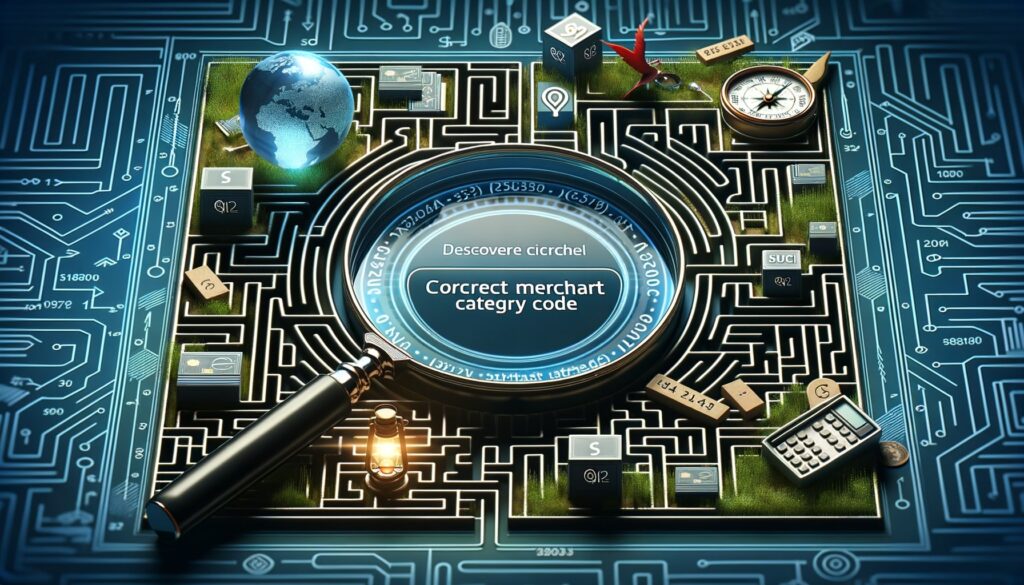
By American October 17, 2024
Finding the right Merchant Category Code (MCC) for your business is essential to ensure accurate classification, fair processing fees, compliance with industry regulations, and even optimization of tax reporting. MCC codes are used by payment processors and credit card networks to categorize businesses based on the types of goods and services they offer. Selecting the correct merchant category code can save your business money on processing fees, enhance tax deductions, and improve relationships with credit card issuers.
In this comprehensive guide, we’ll explore how to find the right MCC code for your business. We will discuss why MCC codes matter, how they are assigned, where to look them up, and strategies for ensuring you have the right code. By the end of this guide, you will have a clear understanding of how to verify and update your Merchant Category Code (MCC) to optimize your business operations.
What Is an Merchant Category Code (MCC) ?
An Merchant Category Code (MCC) is a four-digit number that categorizes a business by the primary goods or services it provides. These codes are issued by credit card networks like Visa, Mastercard, American Express, and Discover, and are used by banks, payment processors, and credit card companies to classify transactions for various purposes such as rewards programs, fees, and regulatory compliance.
Purpose of Merchant Category Codes (MCCs)
Merchant Category Codes (MCCs) serve several key functions, including:
- Classifying Businesses: Payment processors and financial institutions use MCC codes to determine the nature of the business and its level of risk.
- Determining Fees: Interchange fees, which are fees paid by merchants for accepting card payments, are often calculated based on the MCC code of the business. Higher-risk businesses tend to face higher fees.
- Tax Reporting: Merchant Category Codes (MCCs) are used for tax reporting purposes. Certain transactions may qualify for deductions or exemptions based on the business’s MCC code.
- Rewards Programs: Credit card companies use MCC codes to determine which purchases qualify for rewards such as cashback, points, or travel miles.
Why Choosing the Right MCC Code Matters
Choosing the correct Merchant Category Code (MCC) has a significant impact on several aspects of your business. An incorrect code can lead to higher processing fees, affect your eligibility for tax exemptions, and create complications with customer rewards programs.
Impact on Interchange Fees
Interchange fees are a substantial part of the cost for businesses accepting credit and debit card payments. The Merchant Category Code (MCC) assigned to your business helps card networks and issuing banks determine the level of risk involved in each transaction, which in turn affects the interchange fee.
For example, a high-risk business such as a travel agency may be assigned an Merchant Category Code (MCC) that results in higher fees than a low-risk business like a grocery store. Selecting the correct MCC code ensures you are not overpaying for your transactions.
Impact on Tax Reporting
Certain MCC codes are linked to tax-deductible or tax-exempt transactions. Nonprofit organizations, for example, benefit from Merchant Category Codes (MCCs) that signify charitable activities, making donations to these organizations eligible for tax deductions.
An incorrect Merchant Category Code (MCC) can result in missed tax benefits. For example, a business categorized under the wrong Merchant Category Code (MCC) may not be able to claim deductions for qualifying expenses, or they may fail to comply with regulatory requirements related to tax-exempt transactions.
Impact on Customer Rewards Programs
Credit card rewards programs rely heavily on MCC codes to determine which purchases are eligible for rewards. Customers expect to earn points, cashback, or miles based on where they shop, and the Merchant Category Code (MCC) assigned to your business determines whether their transactions qualify for those rewards.
If your business is misclassified under the wrong MCC code, it may prevent customers from earning rewards, which could lead to dissatisfaction and lost business.
How Merchant Category Codes (MCCs) Are Assigned
The Role of Payment Processors
When a business sets up a merchant account with a payment processor or acquiring bank, the payment processor assigns an Merchant Category Code (MCC) based on the type of business and the primary products or services it provides. While businesses cannot directly choose their Merchant Category Code (MCC), they can provide details about their operations to help ensure they are classified correctly.
Criteria for Assigning MCC Codes
Payment processors use several criteria to assign an MCC code, including:
- Business Type: The primary activity of the business is the main factor used to assign an MCC code. This may include retail, service-based businesses, or online operations.
- Transaction Risk: Some industries are inherently riskier than others (e.g., gambling or travel), and those industries are assigned specific Merchant Category Codes (MCCs) that reflect this risk.
- Industry Classification: Different industries have their own specific MCC codes, such as healthcare, retail, or hospitality.
How to Verify Your MCC Code
You can verify your Merchant Category Code (MCC) by reviewing your payment processing statements or contacting your payment processor. Payment processors typically include your Merchant Category Code (MCC) in your monthly transaction reports, and you can also reach out to your account manager for clarification if needed.
Steps to Finding the Right MCC Code
Finding the correct MCC code for your business requires careful consideration of your primary products or services, as well as understanding the full scope of your operations. Here are the steps you can take to identify and confirm your Merchant Category Code (MCC).
1. Understand Your Primary Business Activity
The first step in finding the correct MCC code is to clearly define your primary business activity. What is your business’s core offering? Are you selling goods, providing services, or offering a combination of both? Make sure you classify your business based on the majority of your transactions, as this will help you pinpoint the right code.
2. Review MCC Code Lists
Credit card networks and payment processors maintain comprehensive lists of Merchant Category Codes (MCCs). You can access these lists online through credit card network resources like Visa, Mastercard, or American Express, or consult with your payment processor.
Some common MCC codes include:
- 5411: Grocery Stores and Supermarkets
- 5812: Restaurants
- 7011: Hotels and Motels
- 5732: Electronics Stores
- 8398: Charitable Organizations Review these lists carefully to find the code that aligns with your primary business activities.
3. Consult Your Payment Processor
Your payment processor can be a valuable resource when it comes to determining the correct MCC code for your business. Reach out to your payment processor or acquiring bank for assistance in identifying the most accurate Merchant Category Code (MCC) for your business.
If your business offers multiple services or operates across various industries, your payment processor can guide you in selecting the code that best represents the majority of your transactions.
4. Check Your Processing Statements
Most businesses already have an assigned MCC code that appears on their monthly processing statements. These statements will often include a breakdown of transactions along with the associated Merchant Category Code (MCC). Review these statements to verify that your current MCC code accurately reflects your business activities.
5. Request a Code Change If Necessary
If you believe your Merchant Category Code (MCC) is incorrect or no longer reflects your current business model, you can request a code change from your payment processor. Be prepared to provide supporting documentation, such as business licenses, tax documents, or descriptions of your services, to demonstrate why a new code is necessary.
The Risks of Using an Incorrect MCC Code
Using the wrong MCC code for your business can have a range of negative consequences, including higher fees, compliance issues, and damage to customer satisfaction. Below are some of the risks associated with using an incorrect Merchant Category Code (MCC).
1. Higher Interchange Fees
An incorrect Merchant Category Code (MCC) can cause your business to be classified as higher risk than it actually is. This, in turn, can lead to higher interchange fees for card transactions. For example, a business misclassified as an online gambling service may be charged significantly higher fees than a retail store.
2. Missed Tax Benefits
Certain Merchant Category Codes (MCCs) are linked to tax benefits, such as charitable organizations that qualify for tax-exempt status. If your business is incorrectly classified, you could miss out on important tax deductions or exemptions.
3. Customer Dissatisfaction
Misclassification can also impact your customers. If they do not receive the rewards they expect because your business is categorized incorrectly, they may be less likely to return in the future. Ensuring that your MCC code is accurate will help keep your customers happy and retain their loyalty.
Best Practices for Maintaining the Correct MCC Code
Once you have identified and verified your MCC code, it’s important to follow best practices to ensure that your classification remains accurate as your business evolves.
1. Regularly Review Your Business Model
As your business grows and evolves, your primary activities may change. For example, a business that started as a retail store may expand into offering services, or an online business may open a physical location. Periodically review your Merchant Category Code (MCC) to ensure that it still reflects your current operations.
2. Communicate Changes with Your Payment Processor
If your business undergoes significant changes, such as adding new services or entering a different industry, communicate these changes with your payment processor. They can help you adjust your Merchant Category Code (MCC) to reflect your new business model, ensuring that your fees and reporting are accurate.
3. Keep Records of Your Transactions
Maintaining clear records of your transactions and business activities can help you demonstrate your primary business activity to your payment processor if a review of your MCC code is needed. This documentation can be crucial in making the case for a code change if necessary.
FAQs About Merchant Category Codes (MCCs)
Q1: How do I find out my current MCC code?
You can find your MCC code by checking your payment processing statements or contacting your payment processor. Most payment processors include the MCC code in monthly reports.
Q2: Can I choose my own MCC code?
No, MCC codes are assigned by payment processors or acquiring banks. However, you can provide details about your business activities to ensure the correct code is assigned.
Q3: What happens if my MCC code is wrong?
If your MCC code is incorrect, you could face higher interchange fees, missed tax benefits, or dissatisfied customers. It’s important to correct the code as soon as possible by
requesting a change from your payment processor or acquiring bank.
Q4: Can my business have multiple MCC codes?
In some cases, businesses that offer a wide range of services or operate in different sectors may have more than one MCC code. However, most businesses are assigned a single MCC code that reflects their primary business activity. If you think your business requires more than one code due to diverse offerings, consult with your payment processor.
Q5: How often should I review my MCC code?
It’s a good idea to review your MCC code at least annually or whenever your business model changes significantly. This will ensure that your transactions are being processed accurately and you aren’t paying unnecessary fees.
Q6: What documentation do I need to request an MCC code change?
When requesting an MCC code change, you may be asked to provide documents such as your business license, tax forms, or a detailed description of your services. These documents help demonstrate your business’s activities and justify the need for a code change.
Conclusion
Finding the right MCC code for your business is crucial for optimizing your payment processing costs, ensuring regulatory compliance, and maintaining good customer relations. Merchant Category Codes (MCCs) play a key role in determining interchange fees, tax reporting, and credit card rewards, so getting the correct classification can significantly impact your bottom line.
By following the steps outlined in this guide—understanding your primary business activity, consulting Merchant Category Code (MCC) lists, working with your payment processor, and regularly reviewing your code—you can ensure that your business is categorized accurately. Staying proactive about your MCC code can save you money, protect your tax benefits, and keep your customers satisfied.
If you ever discover that your Merchant Category Code (MCC) is incorrect or no longer reflects your current business model, it’s important to address the issue promptly by contacting your payment processor. With the right MCC code in place, your business will be better positioned for financial success.





